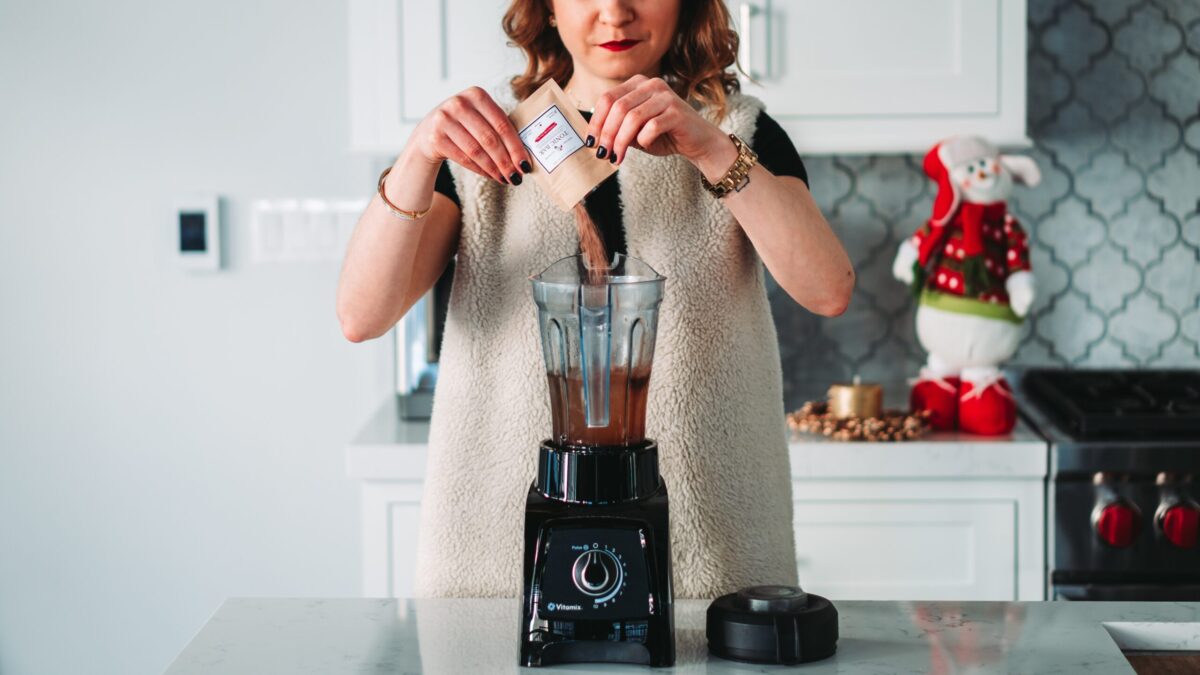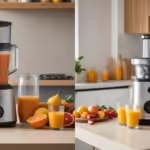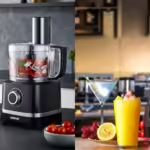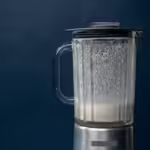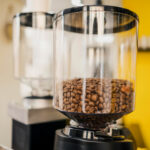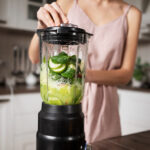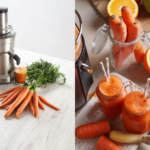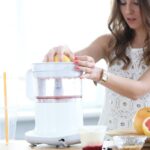If you are a juice lover then you should know the answer to the question – what are the types of juicer machines? Juicer machines have become an essential kitchen appliance for health-conscious individuals seeking fresh and nutritious beverages. With an array of options available, it’s important to understand the different types of juicer machines to make an informed choice.
Types of Juicer Machines
Centrifugal Juicers (Fast Juicers):
Fast-spinning blades separate juice from fruits and vegetables. Quick and convenient but may reduce nutrient content due to heat and oxidation. The centrifugal juicer is best for carrots, celery, cucumbers, beets, spinach, kale, tomatoes, bell peppers, broccoli, cauliflower, apples, berries, grapes, pineapples, watermelon, kiwi and pears.
Masticating Juicers (Slow/Cold Press/Auger Juicer):
Slow, chewing-like motion crushes produce for higher nutrient retention. Great for leafy greens and soft fruits. Masticating juicer is also best for carrots, celery, cucumbers, beets, spinach, kale, tomatoes, bell peppers, broccoli, cauliflower, apples, berries, grapes, pineapples, watermelon, kiwi and pears. This is also perfect for greens like spinach, kale, swiss chard, romaine lettuce, collard greens, arugula, watercress, dandelion greens, beet greens, and bok choy.
Citrus Juicers (Reamer):
Designed specifically for citrus fruits like oranges, lime and lemons, efficiently extracts juice without the need to peel.
Twin Gear Juicers (Triturating Juicers):
Two interlocking gears press produce for maximum juice yield and nutrient preservation. Ideal for juicing tough veggies.
Wheatgrass Juicers:
Specially crafted to extract juice from wheatgrass, delivering high levels of nutrients from this superfood.
Nutrient Press Juicers:
Utilizes hydraulic pressure to extract juice, minimizing oxidation and retaining more nutrients from a variety of fruits and vegetables.
The below infographics help to determine which types of juicer machines are suitable for specific fruits, vegetables and greens.
Which is a Better Blender or a Juicer?
There are different types of juicer machines and each machine has its functionality and importance. Deciding whether a blender or a juicer is better depends on your specific preferences, dietary goals, and the type of beverages you want to prepare. Both appliances offer unique benefits, and here’s a more detailed comparison to help you make an informed choice:
Blenders:
Blenders are versatile and can handle a wide range of ingredients. They blend whole fruits, vegetables, and other elements, including fiber and pulp. This results in a thicker, more filling beverage known as a smoothie. Blenders retain the nutrients found in the entire produce, including fiber, which promotes better digestion and can help regulate blood sugar levels. Smoothies are often consumed as meal replacements or snacks due to their higher fiber and nutrient content.
Juicers:
Juicers, on the other hand, extract the liquid portion of fruits and vegetables, separating the pulp and fiber. This process concentrates the vitamins, minerals, and antioxidants found in the juice, providing a more concentrated dose of nutrients. Juice from a juicer is lighter and less filling than a smoothie, making it a refreshing option. Without the fiber, the juice is absorbed more quickly into the bloodstream, delivering nutrients rapidly.
In summary, the better choice between a blender and a juicer depends on your personal preferences, dietary goals, and the type of beverages you want to incorporate into your routine. Consider factors such as fiber content, nutrient concentration, texture, and overall convenience to make the decision that aligns with your needs.
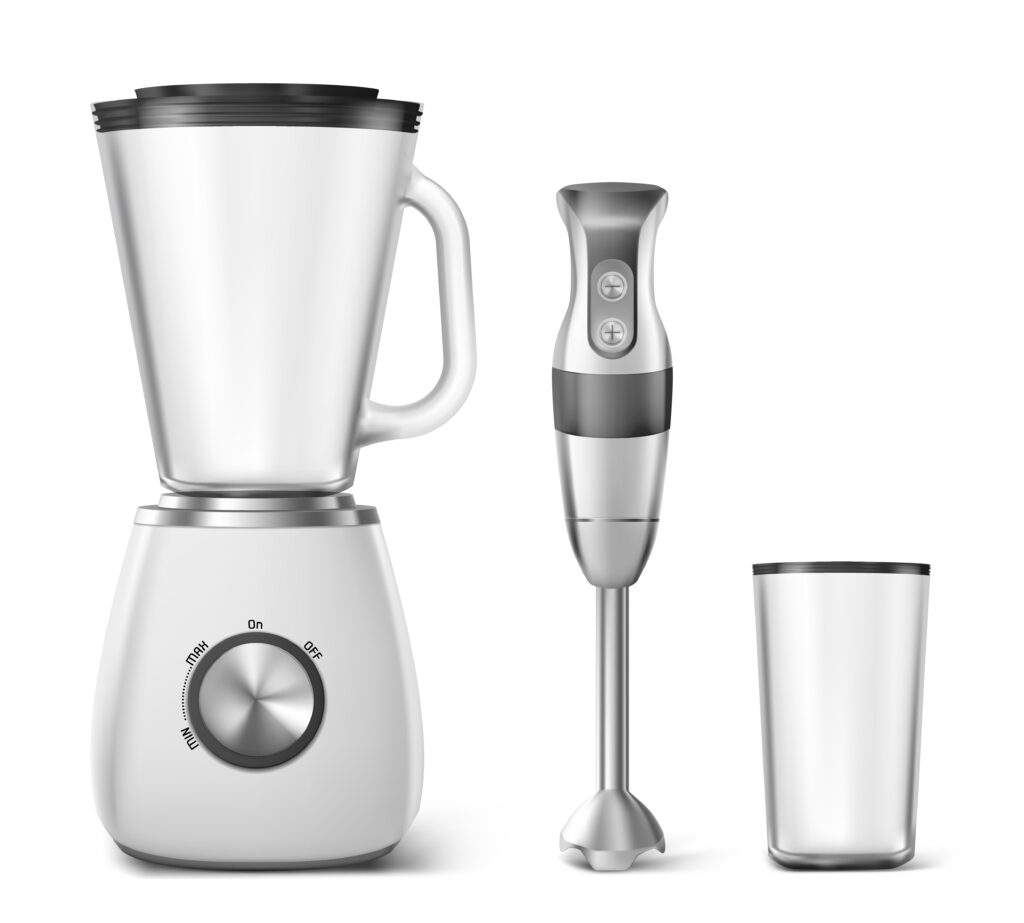
Types of Blender
Besides of types of juicer machines, various types of blenders are available in the market. Blenders come in various types, each designed to serve different purposes and suit different needs. Here are some common types of blenders
Countertop Blenders:
These are the most common type of blenders used in households. They sit on the kitchen countertop and are versatile enough to handle a wide range of blending tasks, such as making smoothies, pureeing soups, crushing ice, and blending sauces.
Immersion Blenders (Hand Blenders):
Also known as hand blenders or stick blenders, these are handheld devices with blending blades at one end. They are used directly in the container holding the ingredients, allowing for easy blending without the need to transfer the mixture to a separate blender jar.
Personal Blenders:
Personal blenders are compact and designed for single-serving smoothies and shakes. They usually come with a blending jar that doubles as a travel cup, making it convenient to blend and take your drink on the go.
High-Performance Blenders:
These blenders are more powerful and designed to handle heavy-duty tasks, such as blending tough ingredients, making nut butter, grinding grains, and creating smooth textures in various recipes.
Commercial Blenders:
Commercial blenders are built for heavy use in restaurants, cafes, and other food service establishments. They are durable and capable of handling large volumes of ingredients to serve many customers.
Vacuum Blenders:
Vacuum blenders remove air from the blending container before blending, which helps reduce oxidation and preserve nutrients in the ingredients, resulting in smoother and more nutrient-rich drinks.
Bullet Blenders:
Bullet blenders are compact and powerful personal blenders, named after the original “Magic Bullet” blender. They are designed for convenience and ease of use, often coming with specialized blending cups for quick and easy blending.
Smoothie Blenders:
While not a separate category, some blenders are marketed specifically for making smoothies. They often come with pre-set blending programs optimized for blending smoothie ingredients to achieve smooth and consistent textures.
Each type of blender offers distinct features and advantages, so choosing the right one depends on your blending needs, budget, and available space in your kitchen.
Popular Juicer and Blender in the USA
Popular Juicer Brands:
Breville: Known for its high-quality juicers with various models for different juicing needs, from centrifugal juicers to masticating juicers.
Omega: Offers a wide range of juicers, including masticating and centrifugal models, known for their durability and versatility.
Hurom: Renowned for their slow juicers, which efficiently extract juice while preserving nutrients and minimizing oxidation.
Tribest: Offers juicers like the Greenstar and SoloStar, known for their twin gear technology and quality juicing performance.
Cuisinart: Known for its centrifugal juicers that provide fast juicing results for everyday use.
Popular Smoothie Blender Brands:
Vitamix: A well-known brand offering high-performance blenders that excel in making smooth and creamy smoothies and other blends.
Ninja: Known for its powerful and affordable blenders with various models, including personal and countertop blenders.
Blendtec: Offers powerful blenders with innovative features like touchscreen controls and pre-programmed settings for easy blending.
NutriBullet: Specializes in personal blenders, making single-serving smoothies and shakes convenient for on-the-go lifestyles.
KitchenAid: Offers a range of blenders suitable for making smoothies, shakes, and other blends in stylish designs.
Hamilton Beach: Known for its affordable and functional blenders suitable for everyday blending needs, including smoothies
Highly Rated Juicers For Home Use
Some popular and highly rated juicers for home use include the Omega NC800HDS Nutrition Center Juicer (masticating), Breville JE98XL Juice Fountain Plus (centrifugal), Tribest GSE-5050 Greenstar Elite (twin gear), and the Hurom HP Slow Juicer (cold press). However, the “best” juicer for you ultimately depends on your individual needs and preferences.
Reputable Commercial Juicer Brands
There are several reputable commercial juicer brands known for producing high-quality juicing machines designed for heavy-duty and continuous use in businesses like juice bars, restaurants, cafes, and other commercial settings. Some of the well-known commercial juicer brands include:
Zumex: Zumex is a popular brand known for its commercial citrus juicers. They offer a wide range of models designed specifically for juicing citrus fruits like oranges, lemons, and grapefruits.
Santos: Santos is a French brand that manufactures a variety of commercial juicers, including centrifugal juicers, citrus juicers, and automatic juicers. They are known for their durable and efficient machines.
Omega: Omega is a well-established brand that offers both commercial and home juicers. Their commercial juicers, especially the masticating and twin gear models, are highly regarded for their performance and durability.
Breville: Breville is a brand known for producing high-quality home juicers, but they also have some commercial-grade juicers suitable for smaller businesses.
Champion: Champion Juicers are renowned for their powerful and durable construction. They offer heavy-duty models suitable for commercial use.
Ceado: Ceado is an Italian brand that specializes in commercial juicers, including both centrifugal and automatic juicers. Their products are well-regarded for their reliability and performance.
Waring: Waring is a brand that offers a wide range of commercial kitchen appliances, including commercial juicers. They have both centrifugal and citrus juicer models.
Nutrifaster: Nutrifaster is known for its centrifugal juicers designed for commercial applications. Their machines are efficient and durable.
Robot Coupe: Robot Coupe is a brand that manufactures a variety of commercial kitchen equipment, including commercial juicers suitable for juice bars and restaurants.
Hurom: While Hurom is primarily known for its home juicers, they also offers some commercial-grade slow juicers suitable for small businesses.
When choosing a commercial juicer, it’s essential to consider factors such as the type of juicer (centrifugal, masticating, citrus, etc.), capacity, motor power, ease of cleaning, and warranty. Reading reviews and comparing specifications will help you find the best commercial juicer that meets your business needs.
We comprehensively tried to cover the topic – what are the types of juicer machines in our blog post and hope you will like our effort.
Juicers have become essential for health-conscious individuals seeking fresh, nutritious beverages. Centrifugal juicers offer fast but less nutrient-retentive juicing due to heat and oxidation. Masticating juicers are better for leafy greens and soft fruits. Citrus juicers are ideal for citrus fruits, twin-gear for tough veggies, wheatgrass juicers for wheatgrass, and nutrient press juicers preserve nutrients with hydraulic pressure. When choosing between a blender and a juicer, consider preferences, dietary goals, and the desired beverage types. Each juicer type caters to specific needs, providing a variety of options for individuals looking to incorporate healthy and delicious juices into their diet.
FAQ’s
What is a slow juicer?
A slow juicer is a type of juicing machine that operates at a low speed to extract juice from fruits and vegetables.
Which juice is best for daily use?
Green juice, made with a combination of leafy greens like spinach or kale, cucumber, celery, and lemon, is often considered a nutritious option for daily consumption due to its high nutrient content.
What is a cold juicer?
A cold juicer, also known as a slow juicer or masticating juicer, operates at a low speed to extract juice without generating excessive heat, preserving nutrients.
What to avoid when juicing?
When juicing, it’s important to avoid excessive consumption of fruit juices due to their high sugar content. Additionally, avoid juicing unclean or spoiled produce and relying solely on juice as a meal replacement
